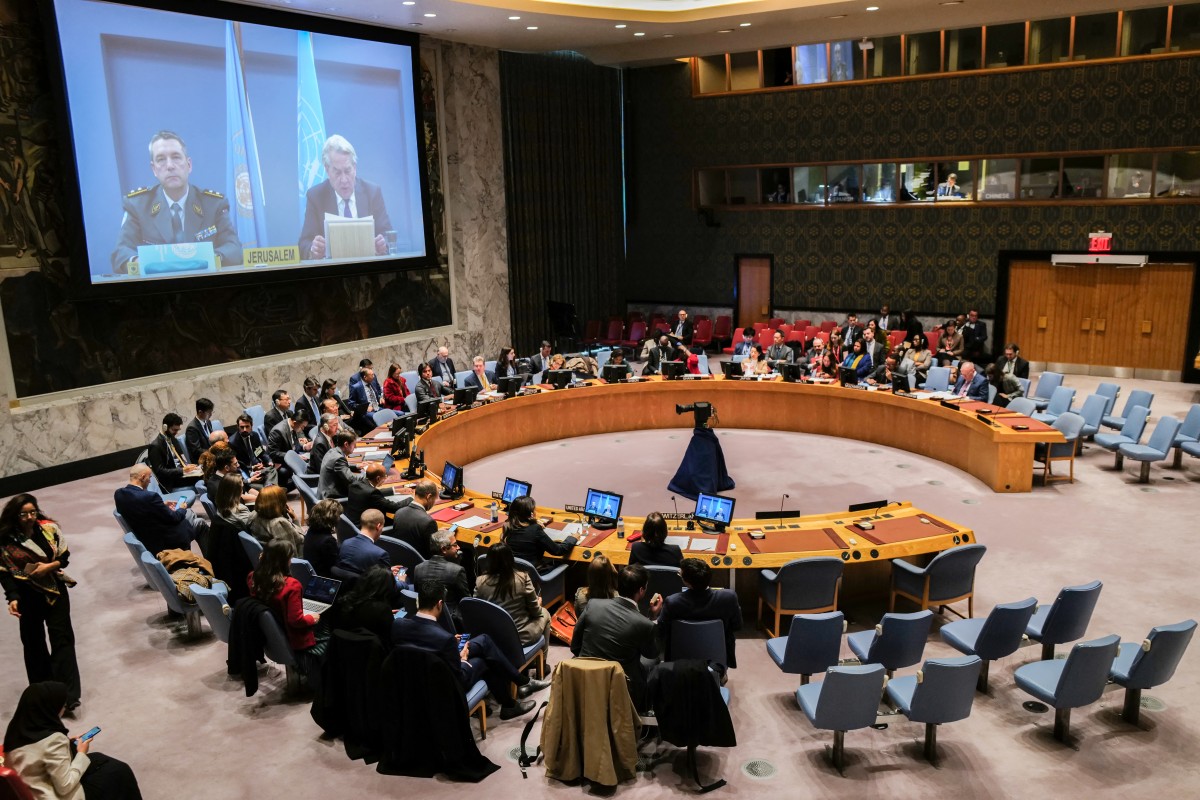United Nations, United States — The UN Security Council is struggling to find a unified voice on the war in Gaza, recently swapping a call for a “lasting cessation of hostilities” with a draft resolution demanding the fighting’s “suspension.”
Even still, members of the council are grappling to find common ground: though a vote on the resolution is scheduled Tuesday, after being postponed Monday, it might be delayed again, diplomatic sources tell AFP.
Israel — backed by its ally Washington, a veto-wielding permanent Security Council member — has opposed the term “cease-fire.” This is one of the sticking points for the divided body to navigate as diplomats call for a “pause” or a “truce,” or try to qualify any cease-fire as “humanitarian.”
The current struggle comes after an impasse earlier this month, when the United States, despite unprecedented pressure from UN Secretary-General Antonio Guterres, blocked the adoption of a Security Council resolution on the war.
It called for an “immediate humanitarian ceasefire” in the Gaza Strip, where Israel continues its deadly strikes in retaliation for Hamas’s unprecedented October 7 attack.
Last week, the General Assembly adopted the same nonbinding resolution by 153 votes to 10, with 23 abstentions, out of 193 member states.
On the strength of that overwhelming support, Arab countries announced the new attempt at the Security Council.
A draft text prepared by the United Arab Emirates, obtained by AFP on Sunday, called for “an urgent and lasting cessation of hostilities to allow unimpeded access of humanitarian aid to the Gaza Strip.”
But according to diplomatic sources, a new modified text is now on the table, in an attempt to inch toward a compromise.
That text is less direct, calling for “the urgent suspension of hostilities to allow safe and unhindered humanitarian access, and for urgent steps towards a sustainable cessation of hostilities.”
Aid ‘far short’ of need
Like in previous texts, Hamas is not named in current draft resolution — a move that has in the past drawn ire from the United States.
Instead, it “condemns all violations of international humanitarian law, including all indiscriminate attacks against civilians,” and demands “the immediate and unconditional release of all hostages.”
The new draft text also calls on the parties in the conflict to facilitate the entry and distribution of aid across all of the Gaza Strip, as well as for Guterres to put in place a monitoring system for such aid.
Senior United Nations official Tor Wennesland said on Tuesday that Israel’s steps to allow aid into Gaza until now have been “far short of what is needed.”
“The delivery of humanitarian aid in the (Gaza) Strip continues to face nearly insurmountable challenges,” said Wennesland, the organization’s special coordinator for the Middle East peace process.
“Amid displacement at an unimaginable scale and active hostilities, the humanitarian response system is on the brink. Limited steps by Israel… are positive, but fall far short of what is needed to address the human catastrophe on the ground.”
Earlier in the day, Israeli President Isaac Herzog said his country was “ready for another humanitarian pause and additional humanitarian aid in order to enable the release of hostages.”
Growing impatience
Since the start of the war between Israel and Hamas, the Security Council has been under fire, having only managed to adopt a single text, in mid-November, calling for humanitarian “pauses” of a few days to allow aid into the Palestinian territory.
Five other draft resolutions were rejected, two of them due to US vetoes.
President Joe Biden meanwhile has exhibited growing impatience with Israel, warning that its ally risks losing the support of the international community for its “indiscriminate” bombardment of the Gaza Strip.
After the attack on October 7, which Israeli authorities say left around 1,140 people dead, most of them civilians, Israel vowed to “annihilate” Hamas, pounding the Palestinian territory, laying siege to it and conducting a vast ground operation.
The Hamas-run health ministry in Gaza says Israel’s military response has killed more than 19,667 people, mostly women and children.

